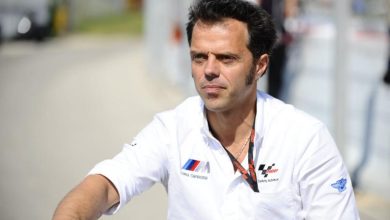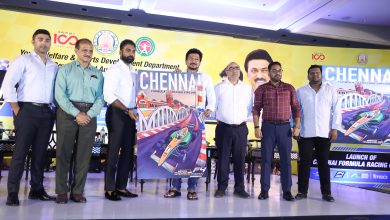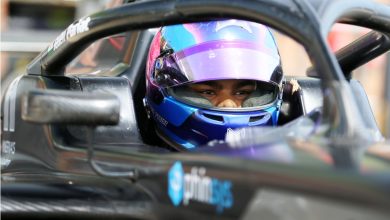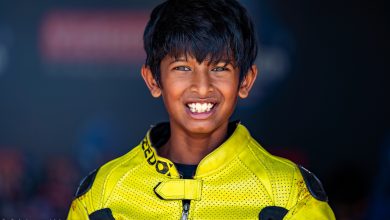‘F1 race’ in the oceans: It is not F1 H2O
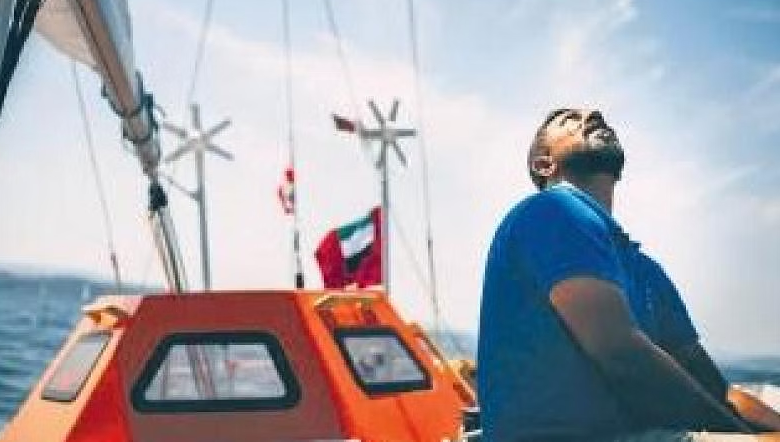
Ronnie Kuriakose tracks in The New Indian Express, Indian aquaman Commander Abhilash Tomy’s cruise in the Golden Globe Race, considered one of the world’s toughest yacht races!
KOCHI: The morning of April 15 saw the who’s who of the Indian Navy poring over reports of the wind pattern and weather system over the North Atlantic. They were plotting the position of Bayanat and its skipper, Commander (retd) Abhilash Tomy.
A former naval aviator, Abhilash is contesting the Golden Globe Race (GGR), considered one of the world’s toughest yacht races. In its final leg, just when he was gaining ground, Abhilash had made a manoeuvre that surprised many.
While his fellow competitor and race leader Kirsten Neuschäfer of South Africa navigated east towards their final stop at Les Sables d’Olonne (LSO) on the French coast, Abhilash continued to climb north.
Various theories were floated, but they all had a common denominator: Abhilash knew what he was doing. “There have been numerous instances in the race where he demonstrated just how good a sailor he is. Abhilash always has a plan,” says Sandra Shipp, his team manager.
Indeed! On April 17, Abhilash’s “risky” move paid rich dividends. Nearing the Azores islands, Bayanat had the wind on its stern and was picking up speed. “Boldness and panache were Abhilash’s signature this weekend,” read the race report on Monday.
On Wednesday, the 43-year-old had eked out a 25-nautical mile lead over Kristen for the first time in months. With less than 1,000 nautical miles to go, it promises a thrilling finale, uncommon for a yacht race. “This is an F1 race right in the middle of the ocean,” remarks Captain D K Sharma (retd), a former Navy spokesperson.
Meanwhile, the sheer brilliance of Abhilash’s manoeuvre is only sinking in. “He is one hell of a mariner,” says his friend Ramesh Menon. “Even after months of hardships on the sea, to have the sharpness of mind and the gut instinct to know where he must go to get the wind is simply stellar.”
Unlike other sailing competitions, GGR does not permit the use of modern navigational instruments.
Only what was available to Sir Robin Knox-Johnston in the inaugural race of 1968. So, no GPS, electric autopilot, chart plotters, or electronic compasses. The sailors must rely on celestial navigation, the sextant, and the barometer.
According to Don McIntyre, the race’s founder and chairman, this retro experience is in homage to the ‘Golden Age’ of sailing, when the marriage of traditional seamanship and the sailor’s ingenuity and passion decided the outcome of races.
The race
The nearly 30,000 nautical mile-long, solo, non-stop circumnavigation around the world is no easy task. Only a handful of people have done it. The GGR, however, is a different game altogether. It imposes further limitations on the sailor beyond what the elements unfailingly do.
“It is like going to outer space. You have to be 200% ready,” says Commander Vijay K Vadhera (retd), former skipper of INSV Samudra, which completed the Navy’s maiden round-the-world voyage in 1988.
Instruments from 1968 mean that sailors have to manually adjust their boat’s course at regular intervals while also tending to a slew of tasks onboard. “That’s perhaps the defining feature of GGR: to man the entire boat single-handedly with limited technological assistance,” says Vice Admiral I C Rao (retd).
According to the veteran, what saps most sailors undertaking this odyssey is lack of good sleep. In the case of Abhilash, it is worse.
The two knockdowns that Bayanat endured early on in the race rendered its electrical system and the wind pilot useless. This means Abhilash has had to steer the boat on rough seas manually. So, not many winks. Besides, the fuel lines that powered his boat’s engine were fouled, the main sail tore, and the wind generators, the halyards, and the wind vane were damaged in a storm.
Amid all these, Abhilash’s resourcefulness and humour shone through. On one occasion, he tweeted: “I need a toilet door. Not used to such lack of privacy,” — a reference to how he had to chop up his toilet door to rebuild the damaged wind vane. “Though the other entrants are all fantastic sailors, not many were able to tackle the problems with such great ease,” notes Vice Admiral Rao.
Of the 16 sailors, only three contestants remain. Two participants were moved to the GGR’s ‘Chichester’ class after they made a stopover for repair works.
Sailing: inherited and earned
Unlike the other participants, Abhilash does not hail from a country wherein sailing is popular. Yet, he is the race’s strongest contender. “The training that Abhilash received from the Navy has certainly played a major role. It has taught him how to take challenges in his stride,” Commodore Srikant B Kesnur (retd), navy historian and director of the Maritime Warfare Centre.
“The specialist training he underwent as a naval aviator gave him key insights into how to read the weather, wind, waves, barometric pressure, and other technical aspects. We saw Abhilash putting this technical prowess to good use this weekend.” Equally influential was his childhood. “A deep affinity for the sea and sailing was fostered from a very young age,” says his father, Lt Commander V C Tomy (retd).
“Once, in Mumbai, we found Abhilash punting through the backwaters on a makeshift raft made out of thermocol. We didn’t scold him. There was no need to.” The 72-year-old does not believe in holding children hostage to lofty ambitions or caging them with rules. “They should be left free to be who they are, follow their passions,” he says.
This silent consent meant there was one less burden on Abhilash’s shoulders as he went about realising his desire — to take part in the GGR. “It is the next natural stop for any adventurer, and Abhilash is no different,” says Captain Sharma.
Second chance
The 2022 GGR was Abhilash’s second shot at the race. He participated in the 2018 edition, which marked the 50th anniversary of Sir Robin Knox-Johnston’s voyage. However, the race didn’t go as intended.
On September 21, 2018, a little over two months into the race and when Abhilash was cruising in the third position, a storm, with winds reaching 70 knots and waves as high as 14 metres, battered his boat in the remote southern Indian Ocean. His boat Thuriya capsized, leaving the sailor with a debilitating back injury, immobilised and adrift, at the mercy of the fickle sea.
Abhilash’s rescue was one of the most dramatic moments in the race’s history, highlighting the dangers and challenges that sailors face in this iconic event. Abhilash’s resilience, and unwavering spirit enthralled many.
With titanium rods in his spine and five vertebrae fused into one, Abhilash “had to learn to walk again” following the 2018 injury. Yet, his eyes were set on the far horizon. When he announced his interest in competing again, the sailing community rejoiced.
Commander H S Rawat, the last commanding officer of INS Vikrant, who had followed the 2018 race closely, calls Abhilash’s return “a miracle” and adds Urmimala’s (Abhilash’s wife) backing is equally admirable.
“Hats off to her for being an absolute champion of Abhilash,” he says. It was not an easy decision for Urmimala to let her husband race again. “We arrived at it over time. I realised that it was his eagerness to race again that eased the mental trauma of 2018,” she says.
In the latest edition of the race, Abhilash seems to have set his course for victory, and Urmimala is his loudest cheerleader. “The toughest parts of the sea are over. What’s ahead is the home run,” assures Cmde Srikant. Several veterans echo the same confidence.
But Urmimala is wary of such predictions. After all, the wind, sea currents, and weather are all unyielding elements. Nobody can predict them. There’s also the sailor’s physical and mental weariness and the boat’s condition to consider.
“But, I have complete faith in Abhilash,” says Urmimala.
Indian king of oceans
- Commander Abhilash Tomy is a retired Indian naval aviator and yachtsman
- Commissioned into the Navy in 2000.
- Completed his flying training in 2002, qualifying as a maritime reconnaissance pilot.
- On November 1, 2012, Abhilash departed on the Mhadei from the Gateway of India in Mumbai to complete a solo, non-stop circumnavigation of the world.
- First Indian, second Asian, and 79th person in the world to accomplish this feat.
- Kirti Chakra – 2013 (Second Navy officer to receive the medal)
- Tenzing Norgay National Adventure Award — 2013




